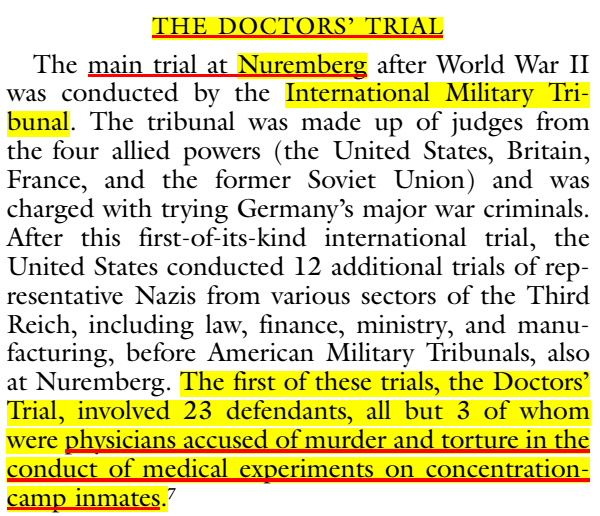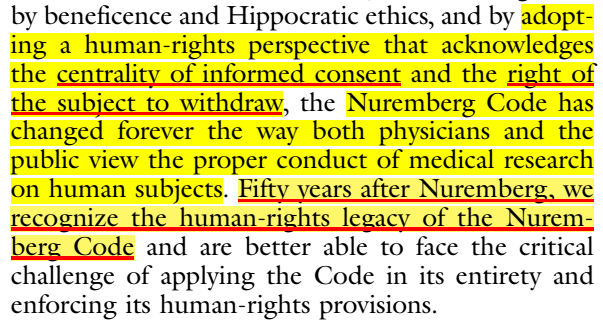Nuremberg Review Part2: Documented Acceptance of Human Medical Rights
"We recognize the human-rights legacy of the Nuremberg Code and are better able to face the critical challenge of applying the Code in its entirety and enforcing its human-rights provisions."
“Without respect for the Nuremberg Code, nothing is stopping governments and organizations from repeating the experiments, coercion, abuse, and various forms of mistreatment and torture that have already been condemned. This means that individual doctors, courts, independent organizations, and individual patients/persons must now take the lead in articulating and defending these fundamental human rights. Otherwise, the general population will be defenseless against medical mandates and human rights violations promulgated “in the interest of public health and national security”, words that can be twisted to justify any crime against humanity, as Germany’s Nazis already showed.” DrV January 2, 2022
Seventy Years Later: The Significance of the Nuremberg Code
Source: Evelyne Shuster, Ph.D. Fifty Years Later: The Significance of the Nuremberg Code. N Engl J Med 1997 nejm.org/doi/full/10.1056/NEJM199711133372006
Key excerpts:
The Nuremberg Code is the most important document in the history of the ethics of medical research. The Code was formulated 50 years ago, in August 1947, in Nuremberg, Germany, by American judges sitting in judgment of Nazi doctors accused of conducting murderous and torturous human experiments in the concentration camps (the so-called Doctors' Trial).
The voluntary consent of the human subject is absolutely essential. This means that the person involved should have legal capacity to give consent; should be so situated as to be able to exercise free power of choice, without the intervention of any element of force, fraud, deceit, duress, overreaching, or other ulterior form of constraint or coercion; and should have sufficient knowledge and comprehension of the elements of the subject matter involved as to enable him to make an understanding and enlightened decision.
Informed consent, the core of the Nuremberg Code, has rightly been viewed as the protection of subjects' human rights. The key contribution of Nuremberg was to merge Hippocratic ethics and the protection of human rights into a single code.
“…by adopting a human-rights perspective that acknowledges the centrality of informed consent and the right of the subject to withdraw, the Nuremberg Code has changed forever the way both physicians and the public view the proper conduct of medical research on human subjects. Fifty years after Nuremberg, we recognize the human-rights legacy of the Nuremberg Code and are better able to face the critical challenge of applying the Code in its entirety and enforcing its human-rights provisions.
My personal PDF copy with highlights
For the original source see nejm.org/doi/full/10.1056/NEJM199711133372006






